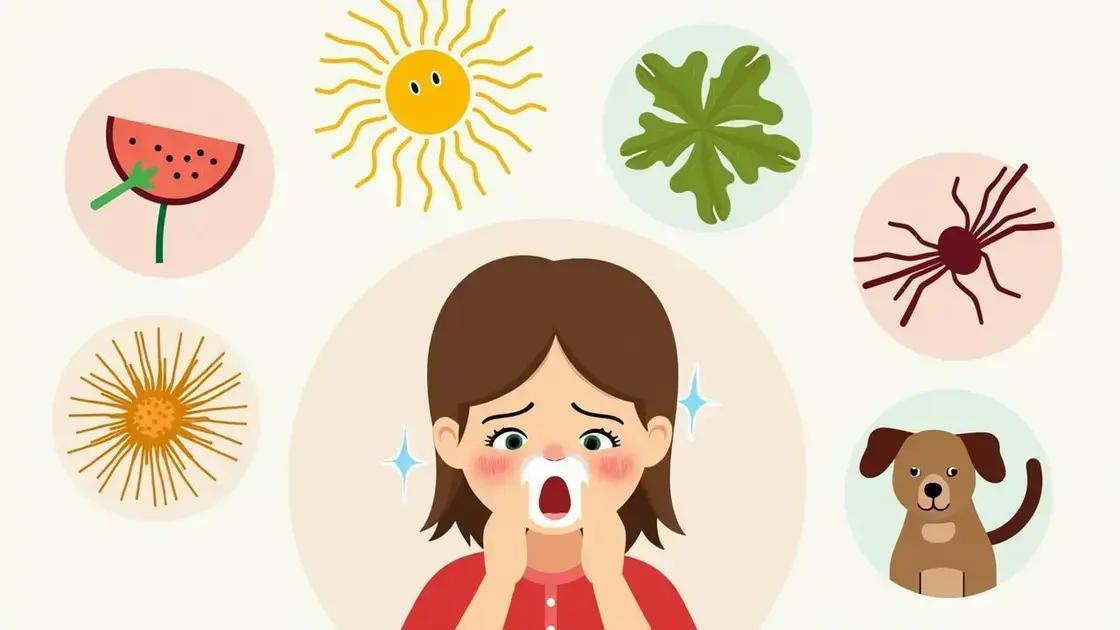How to manage seasonal allergies effectively involves understanding triggers, recognizing symptoms, implementing management techniques like avoiding allergens and using medications, and considering natural remedies such as saline rinses and local honey for relief.
Seasonal allergies can make the joy of spring and summer feel unbearable for many. Understanding how to manage seasonal allergies effectively is crucial for enjoying the outdoors without feeling miserable. In this article, we will discuss common symptoms and triggers, effective management techniques that can help you cope, and explore natural remedies for relief. Staying informed and prepared can transform your seasonal experience.
Understanding Seasonal Allergies

Understanding seasonal allergies is key to managing your symptoms effectively. Seasonal allergies, also known as hay fever or allergic rhinitis, occur when your immune system reacts to allergens in the environment. These allergens are often pollen from trees, grasses, and weeds that become airborne during certain times of the year.
What Triggers Seasonal Allergies?
Many different substances can trigger seasonal allergies. Common triggers include:
- Pollen: Trees release pollen in the spring, grasses in the summer, and weeds in the fall.
- Mold spores: Mold can produce spores that become airborne as they decay in the fall and spring.
- Dust mites and pet dander: While not strictly seasonal, these can exacerbate your symptoms during peak seasons.
How Do Seasonal Allergies Affect You?
When allergens enter your body, they can cause your immune system to react by releasing chemicals like histamine. This reaction can lead to various common symptoms such as:
- Runny or stuffy nose
- Sneezing
- Itchy eyes, nose, or throat
- Coughing
Understanding these triggers and symptoms helps you to identify your specific allergies more effectively. Keep track of when your symptoms flare up and consult with a healthcare professional for proper testing.
Common Symptoms and Triggers

Seasonal allergies can cause a range of uncomfortable symptoms. Recognizing common symptoms and their triggers is important for effective management. Here are the symptoms you might experience:
- Runny or Stuffy Nose: You might feel like you have a cold, but it’s often due to allergies.
- Sneezing: This is a common response to allergens that irritate your nasal passages.
- Itchy Eyes, Nose, or Throat: Many people feel itching in these areas, which can be quite distracting.
- Coughing: Allergies can cause irritation in the throat, leading to a persistent cough.
- Fatigue: The body might feel tired due to the immune response triggered by allergens.
Identifying Triggers
Allergens vary by season and location. The most common triggers for seasonal allergies include:
- Pollen: Trees, grasses, and weeds release pollen into the air, especially during spring and fall.
- Mold Spores: Mold can thrive in damp areas and release spores into the air, typically in fall and spring.
- Pet Dander: While pets aren’t seasonal, their dander can worsen allergy symptoms, especially if you have outdoor pets.
- Dust Mites: Dust mites live in carpets and bedding, which can affect allergies at any time of year.
Track your symptoms and noting when they worsen can help you identify specific triggers, enabling better management of your allergies as you enjoy the seasons.
Effective Management Techniques

Managing seasonal allergies effectively requires a combination of strategies. Here are some effective management techniques to help reduce your symptoms:
Avoid Triggers
One of the best ways to manage allergies is to avoid known triggers. Check local pollen counts and stay indoors on high pollen days. Keep windows closed and use air conditioning whenever possible.
Medication
Over-the-counter medications can provide relief from allergy symptoms. Options include:
- Antihistamines: These help reduce sneezing, runny nose, and itching.
- Decongestants: These can relieve nasal stuffiness and pressure.
- Corticosteroids: Nasal sprays can reduce inflammation in the nasal passages.
Consult with a healthcare provider for personalized advice and dosage.
Allergy Shots
If you have severe allergies, discuss allergy shots (immunotherapy) with your doctor. These shots can gradually help your body become desensitized to specific allergens.
Maintain Indoor Air Quality
Keeping your indoor environment clean can help minimize allergy symptoms:
- Use air purifiers: These can filter out allergens from the air.
- Keep your home dust-free: Regular cleaning helps remove dust mites and mold.
- Wash bedding regularly: Use hot water to wash sheets and pillowcases to eliminate dust mites.
Combining these strategies can greatly improve your quality of life and minimize the effects of seasonal allergies, allowing you to enjoy the changing seasons without discomfort.
Natural Remedies for Relief

Many people seek natural remedies for relief from seasonal allergies. These remedies can help soothe symptoms without the side effects of some medications. Here are some effective options to consider:
Saline Nasal Rinses
Using a saline solution to rinse your nasal passages can help clear out allergens and reduce congestion. You can make a simple saline rinse at home or purchase pre-made solutions.
Local Honey
Consuming local honey might help your body get used to local pollen. Start with a teaspoon a day, as it may boost your immunity to pollen over time.
Herbal Remedies
Several herbs can offer relief from allergy symptoms:
- Nettle Leaf: This herb may help in reducing hay fever symptoms due to its natural antihistamine properties.
- Butterbur: Some studies suggest that butterbur can be as effective as antihistamines.
Essential Oils
Inhaling essential oils such as eucalyptus or peppermint may help open airways and ease congestion. You can use a diffuser or apply diluted oils to your skin.
Regular Exercise
Engaging in regular exercise can strengthen your immune system and help balance your body’s response to allergens. Exercise also promotes better breathing.
Incorporating these natural remedies into your routine can provide relief from seasonal allergy symptoms and enable you to enjoy the outdoors with more comfort and ease.
In summary, effectively managing seasonal allergies is achievable
By understanding the common symptoms and triggers, you can take proactive steps to minimize their impact on your life. Implementing effective management techniques such as avoiding allergens, using medications, and maintaining good indoor air quality can greatly enhance your comfort.
Additionally, exploring natural remedies like saline rinses, local honey, and herbal supplements can provide relief without unwanted side effects. Remember that adopting a holistic approach—combining both management techniques and natural remedies—can lead to the best outcomes in navigating seasonal allergies.
Stay informed, stay prepared, and reclaim your enjoyment of the changing seasons!
FAQ – Frequently Asked Questions about Managing Seasonal Allergies
What are the common symptoms of seasonal allergies?
Common symptoms include a runny or stuffy nose, sneezing, itchy eyes, and fatigue, which can occur during allergy season.
How can I identify my allergy triggers?
Keep track of when your symptoms occur and consult with a healthcare provider for allergy testing to determine specific triggers.
What are effective management techniques for seasonal allergies?
Effective techniques include avoiding known triggers, using over-the-counter medications, implementing allergy shots, and maintaining good indoor air quality.
Are there any natural remedies for seasonal allergies?
Yes, natural remedies like saline nasal rinses, local honey, nettle leaf, and essential oils can help alleviate symptoms.
When should I see a doctor for my allergies?
If your symptoms are severe, persistent, or interfere with your daily life, it’s important to consult a healthcare professional for advice.
Can exercise help with seasonal allergies?
Regular exercise can strengthen your immune system and improve overall health, possibly alleviating some allergy symptoms.













